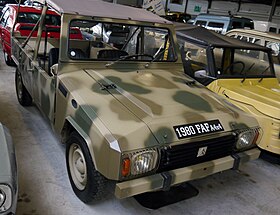Citroën FAF
| Citroën FAF | |
|---|---|
 | |
| Overview | |
| Manufacturer | Citroën |
| Production | 1973–1981 |
| Body and chassis | |
| Class | Compact SUV |
| Body style | 2-door/no-door utility |
| Layout | FF layout |
| Related | Baby-Brousse Citroën 2CV Citroën Méhari Citroën Dyane Citroën Ami Citroën Bijou |
| Powertrain | |
| Engine | Flat-2 |
| Chronology | |
| Successor | Citroën C-Crosser Citroën E-Méhari Namco Pony Super (For Namco Pony) |
The Citroën FAF is a small utility vehicle produced by the French manufacturer Citroën from 1973 until 1981.[1] It was built using a combination of imported and locally sourced components in various developing countries.[2] The body was made of easy to produce, folded steel panels, giving an appearance resembling a metal-bodied version of the Méhari.[3] The flat metal panels and simple components were meant to allow for easier production, mostly in developing countries.[2]
Origin
[edit]The origin of this idea was the privately built 1963 Baby-Brousse from Ivory Coast, and its many derivatives.[2] Notably these include La Dalat (Vietnam), Pony (Greece), Jyane-Mehari (Iran), and Yagan (Chile).
The various Baby-Brousse cars were quite successful, selling over 30,000 units.[2]
Both the FAF and Baby-Brousse are derived from the 2CV. The concept predates the FAF name, so it is often erroneously reported that some of Baby-Brousse vehicles were based on the FAF.[3]
Name and target market
[edit]FAF stood for the French Facile à Fabriquer and Facile à Financer (Easy to Manufacture, Easy to Finance).
The primary target market for the FAF was Africa. However, the concept of a "second-class" car that was connected with the FAF seems to have affected its manufacture and sales remained low.[4]
Pre-FAF cars
[edit]The FAF idea coincided with the widespread production of Baby Brousse 2CV-based vehicles in many countries, so the two often overlap.[5]
In 1969, Citroën's Vietnamese subsidiary began building La Dalat, the first automobile manufactured in Vietnam.[6][7] Production ended when Americans departed Saigon in 1975 at the end of the Vietnam War.[8] In total, 3880 Dalats were built.[9]
In 1972, the Greek firm Namco began production of the Pony. This was the most successful version of these 'simplified' 2CV utility vehicles, selling 30,000 units.[10] The Pony was exported as well, including to the United States of America.[11] Production of this "poor man’s jeep," that benefitted from special tax rules, ended in 1983, two years after Greece joined the European Union. 67% of the parts were of Greek origin.[10]
An attempt to start production in Sri Lanka by the Ceylon Transport Board in the early 1970s failed due to a dispute over royalties, but a prototype was displayed at the Republic Day celebrations in 1974.[12]
Various kit car style bodies inspired by the FAF and Méhari, such as Belgium's VanClee, were also developed.
Production history
[edit]| Country | 1977 | 1978 | 1979 | 1980 | 1981 | Total |
| Portugal | 180 | 30 | 180 | 240 | 180 | 810[2] |
| Guinea Bissau | 0 | 0 | 120 | 180 | 0 | 300 |
| Central African Republic | 0 | 0 | 0 | 60 | 0 | 60 |
| Sénégal | 0 | 0 | 0 | 0 | 15 | 15 |
| Sri Lanka | 1 | 0 | 0 | 0 | 0 | 1 |
| Indonesia | 0 | 0 | 60 | 540 | 0 | 600 |
| Total FAF | 181 | 30 | 360 | 1,020 | 195 | 1,786 |
References
[edit]- ^ "FAF Facile à fabriquer, facile à financer - easy to build, easy to fund page 1".
- ^ a b c d e Marsh, Julian. "Baby Brousse". Citroënët. Archived from the original on 2019-12-22.
- ^ a b Marsh, Julian. "FAF: Facile à Fabriquer, Facile à Financer (Easy to build, easy to fund)". Citroënët. Archived from the original on 2020-11-17.
- ^ "Citroen FAF 4x4 (1977)". Autoruote 4x4 (in Italian). New Explorer. 7 February 2014. Archived from the original on 2020-12-03.
- ^ "Curbside Classic: 1974 Citroën Méhari – Plastic Frenchtastic". Curbside Classic. 22 July 2017. Retrieved 28 August 2020.
- ^ Ha, Thanh. "La Dalat: Mẫu xe "nội" đầu tiên ở Việt Nam" [La Dalat: Vietnam's first "domestic" car] (in Vietnamese). Giao Thong. Archived from the original on 29 July 2017. Retrieved 24 April 2017.
- ^ "Citroën La Dalat – First Car Made In Vietnam". VJT Adventures. Archived from the original on 2017-05-19.
- ^ Clément-Collin, Paul (2016-04-08). "Citroën La Dalat: la perle de l'Orient aux origines africaines!" [Citroën La Dalat: the pearl of the Orient with African origins!]. CarJager (in French). Archived from the original on 2020-05-22.
- ^ "Lot 102: FAF", Vente des réserves de l'Aventure Peugeot Citroën DS (Auction Catalogue) (in French), Leclere Maison des Ventes, 2017-12-10, p. 72, archived from the original on 2017-11-26
- ^ a b "The "poor man's jeep" is back on the Greek roads". GR Reporter. 10 May 2014. Retrieved 24 April 2017.
- ^ Gilbertson, Scotty (2016-04-10). "It's Greek To Me: 1983 NAMCO Pony-Citroën". Barn Finds. Retrieved 2021-08-26.
- ^ Moonesinghe, Vinod (8 December 2019). "The Royalists and the Citroën project". Sunday Times, Sri Lanka. Retrieved 19 August 2020.




